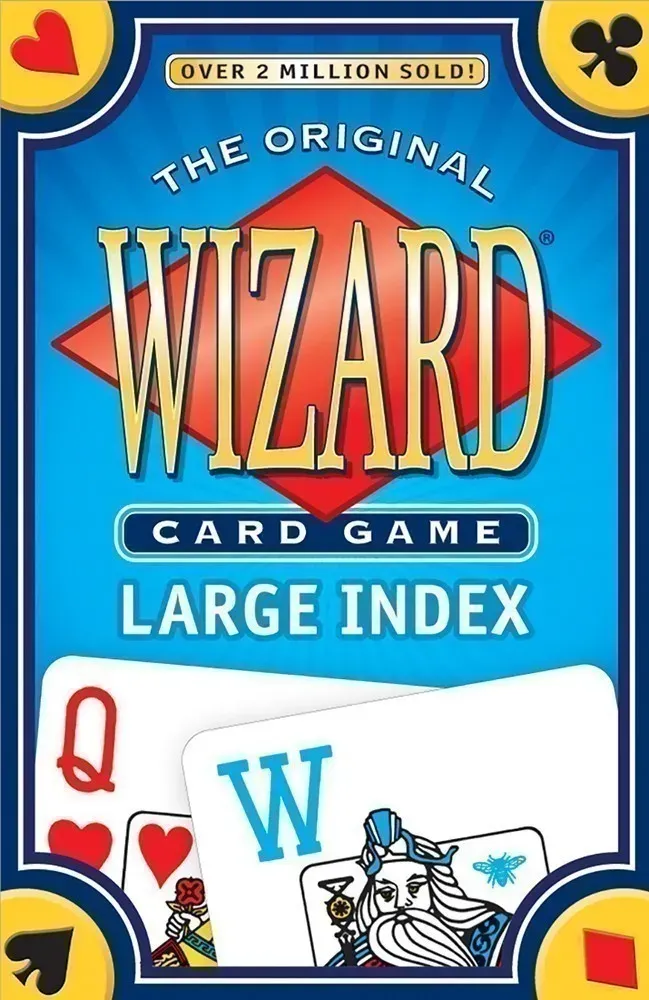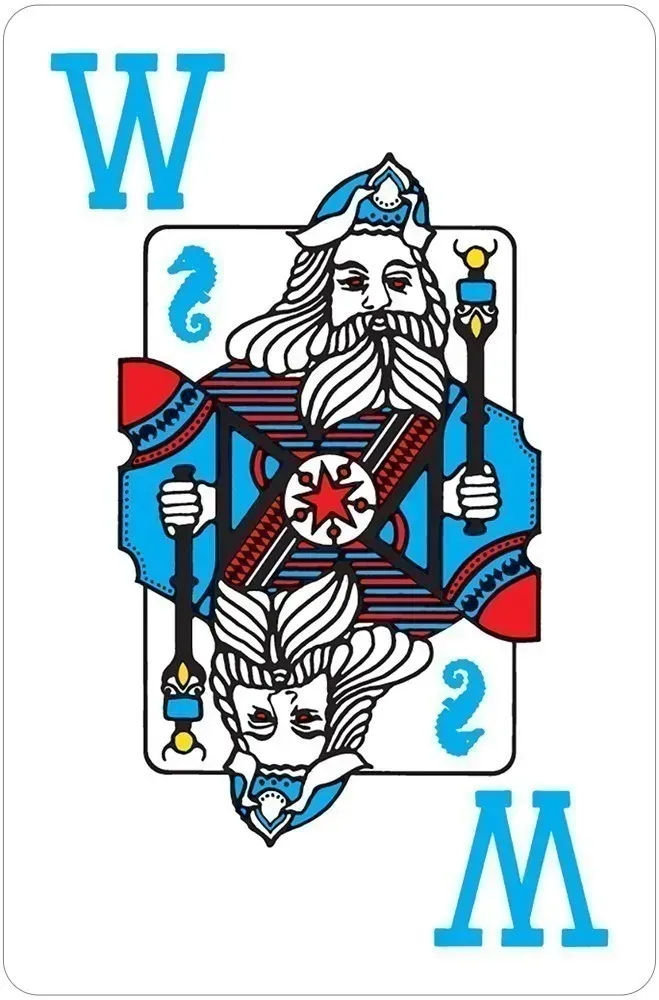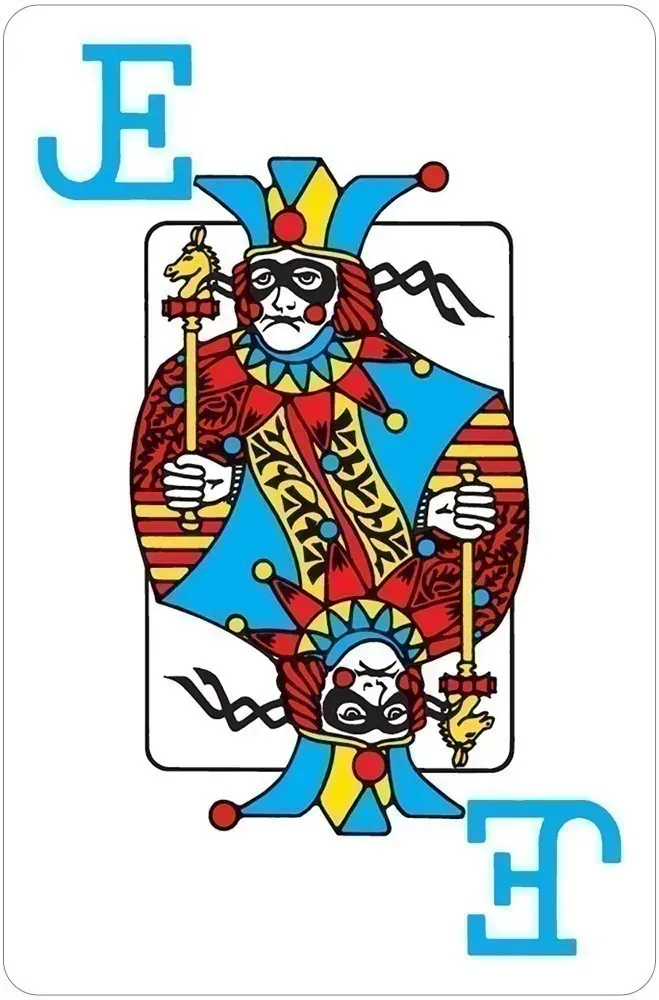
The original, award-winning Wizard® Card Game with new, large index design. Instructions and sample score sheets are included. Oversized scorepad is sold separately.
Wizard Card Game Large Index uses standard Wizard size playing cards with larger numbers and symbols. Ideal for those who are visually impaired.
Wizard FAQs are available for download here.
Wizard® is also available as: Original Wizard® Card Game, Wizard® Card Game Let's Play Edition, Wizard® Card Game 12-deck Display, Canadian Wizard® Card Game, Wizard® Junior Card Game, Wizard® Card Game Deluxe Edition, Wizard® Medieval Edition, and Fantasy Wizard® Card Game.
See also: Wizard® Coins, Wizard® Oversized Scorepads, Wizard® Bidding Wheels, Black Velvet Wizard® Hat, and Deluxe Felt Jester Hat.
-
ISBN978-1-57281-714-2
-
Size2.25" x 3.5"
-
LanguageEN
-
AuthorKen Fisher
You Might Also Like
-
Wizard® Card Game 100% Plastic Playing Cards
Wizard Card Game 100% Plastic Playing Cards. No Ordinary deck of Cards… an EXTRAORDINARY game of STRATEGY! -
Wizard® Oversized Scorepads
The Ultimate Game of Trump!
What Customers Are Saying About Wizard® Card Game Large Index
You might be under the impression that in order to be fun a game has to be complex. It’s true that we tend towards games with a bunch of different components, sneaky player interaction and a little rule that you only get to use once in a while, but when you remember to do it people will stare at you in awe of your skill; or maybe stare at you with pure hatred for remembering that rule. It’s true that we review games from that part of town most often. That doesn’t mean we don’t enjoy games that are very, very simple – when they are also very very clever.
Ken Fisher’s Wizard is one of those games. You almost couldn’t ask for it to be any simpler. Wizard is a trick-taking game: there are four suits of cards with values from 1 to 13. After dealing, one of the remaining cards is revealed to determine the trump suit. The first player plays any card from his hand, the other players then have to follow suit or, if they cannot, either play a trump to win or throw in a card from another color to get rid of it. The trick goes to the player that had the highest trump or, if no trump was played, the highest card in the original suit. The first round is played with only one card per player, each subsequent round with one more until finally all 60 cards are dealt out on the last round, coincidentally not leaving a card to determine the trump suit.
There are two sets of special cards that add some spice: Wizards and Jesters. Both Wizards and Jesters belong to no suit but can be played at nay time, even when you could follow suit. The first Wizard in a trick always wins that trick, no matter what other cards are in it. A Jester never wins any tricks, except in the rare case that the trick contains only Jesters – in that case, the first one wins again. If a Jester is revealed for trump suit, this round has no trumps; in case of a Wizard the dealer chooses a trump suit after seeing his cards.
There is that final piece of rules that puts Wizard in the “very, very clever” category and made it popular enough all over the world to have its own world championship. Before the first card in a turn is played, every player must make a bet how many tricks he is going to take this round. The only way to score points is through fulfilling this bet: 20 for succeeding at all plus 10 for every trick you took. Any trick more or less than your bet not only gets you nothing at all for this round, you even lose 10 points for every trick by which you miss your bet. The most-played (and in my opinion most interesting) variant of Wizard demands that the bets of all players never add up to the real amount of tricks available, making sure that there will not be a peaceful solution.
And suddenly those very simple rules come together to make a much deeper and more enjoyable game than you would expect from “simple trick-taking”. In the first two or three rounds, there still is much luck involved: with only two cards, you’re not exactly drowning in strategic options and whether you win your bet or not depends heavily on card luck. But the first few rounds are only for warming up: from round five on, you have many more options to consider and many more ways to contribute to your own success. In this phase of the game, against experienced opponents, you have to pull all the registers: sometimes you want to rid yourself of a suit that you started with only one or two cards in so you don’t have to follow suit. Sometimes you need to find a way to lose high cards because you find that your bet was too low. You will want to base your bet on these and a couple of other things, like the number of Wizards and Jesters in your hand, but also your distance from the start player. And sometimes you just have to recognize a truly bad hand and bet low in order not to lose points. On the other side of things, a good hand has a strong push-your-luck element where you want to try for more tricks than you’re strictly comfortable with because more tricks still means more points. And there you have it: a game with very simple rules that is nevertheless engaging and quite difficult to master.
— Meople Magazine












